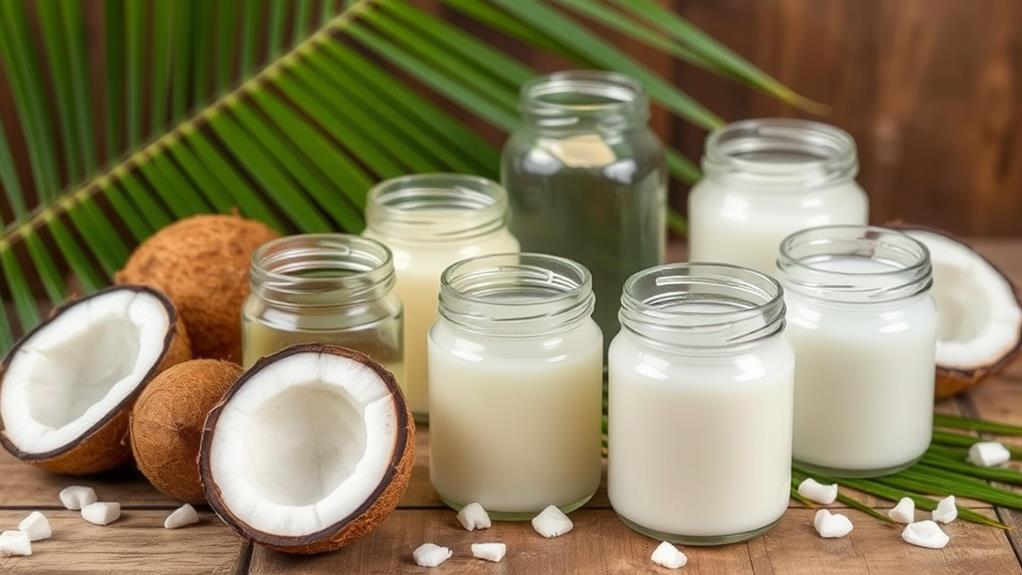When choosing the best coconut oil, you'll find excellent options like Viva Naturals Organic Extra Virgin, Handcraft Blends Fractionated, BetterBody Foods Organic Refined, Nutiva Organic, and Amazon Fresh Organic Refined. These top-rated oils offer versatility for cooking, skincare, and haircare. You'll benefit from their organic certifications, high-quality extraction methods, and various sizes to suit your needs. Consider factors like extraction method, organic status, refinement level, and intended use when making your selection. Whether you're looking for cooking oil or a beauty product, there's a perfect coconut oil waiting for you. Discover how these oils can transform your daily routine.
Key Takeaways
- Viva Naturals Organic Extra Virgin Coconut Oil offers versatile uses and high value for its affordable price point.
- Handcraft Blends Fractionated Coconut Oil is ideal for skincare and as a carrier oil for essential oils.
- BetterBody Foods Organic Refined Coconut Oil has a high smoke point, making it excellent for cooking and baking.
- Nutiva Organic Coconut Oil is cold-pressed, unrefined, and rich in medium chain triglycerides and lauric acid.
- Amazon Fresh Organic Refined Coconut Oil provides affordability and versatility for cooking, skincare, and pet health applications.
Viva Naturals Organic Extra Virgin Coconut Oil (16 fl oz)
Viva Naturals Organic Extra Virgin Coconut Oil stands out for its versatility, making it an ideal choice for health-conscious consumers looking for a multi-purpose product. This 16 fl oz jar of unrefined, cold-pressed oil boasts USDA Organic, Non-GMO, and gluten-free certifications. It's perfect for your hair, skin, and culinary needs.
For your hair, you'll find it hydrates and nourishes, working wonders as a conditioner or hair mask. Your skin will love its moisturizing properties, and you can even use it as a natural makeup remover. In the kitchen, its high smoke point (350°F) makes it great for cooking, baking, and adding flavor to dishes. The user-friendly packaging guarantees easy access, while the affordable price point offers excellent value for a product that can replace multiple items in your home.
Best For: Health-conscious consumers seeking a versatile, organic product for hair care, skin care, and cooking applications.
Pros:
- Multi-purpose: Can be used for hair, skin, and cooking
- High-quality: USDA Organic, Non-GMO, and cold-pressed
- Affordable: Offers great value for its versatility and quality
Cons:
- May solidify at room temperature, requiring warming before use
- Coconut scent might be too strong for some users
- Some may find the 16 fl oz size insufficient for long-term use
Handcraft Blends Fractionated Coconut Oil (16 Fl Oz)
If you're looking for a versatile, high-quality coconut oil that's perfect for skincare, haircare, and aromatherapy, Handcraft Blends Fractionated Coconut Oil is an excellent choice. This 100% pure and natural, premium-grade oil offers numerous benefits for your skin and hair. It's lightweight, absorbs quickly, and won't clog your pores, making it suitable for all skin types, including sensitive skin.
You'll find that this oil is an ideal carrier for essential oils and a great option for massage. It's rich in antioxidants, promoting scalp health and hair growth while adding volume and shine. The pump design guarantees easy dispensing and travel convenience. Made in the USA, this fractionated coconut oil is free from parabens, sulfates, alcohol, and hexane. It's also vegan and cruelty-free, aligning with ethical consumer preferences.
Best For: Those seeking a versatile, high-quality fractionated coconut oil for skincare, haircare, aromatherapy, and as a carrier oil for essential oils.
Pros:
- 100% pure, natural, and premium-grade oil suitable for all skin types
- Versatile uses including moisturizing, massage, and mixing with essential oils
- Made in the USA, free from harmful chemicals, vegan, and cruelty-free
Cons:
- May be more expensive than some other coconut oil brands
- Some users might prefer a solid coconut oil for certain applications
- The pump dispenser, while convenient, may not be ideal for all users
BetterBody Foods Organic Refined Coconut Oil (56 Fl Oz)
BetterBody Foods Organic Refined Coconut Oil is ideal for health-conscious cooks who want versatility without compromising on quality. This USDA Organic, Non-GMO, and Kosher-certified oil is extracted without chemicals, ensuring purity and nutritional value. With a neutral flavor and high smoke point of 425°F, it's perfect for frying, sautéing, and baking.
You'll appreciate its versatility beyond the kitchen. It's excellent for skincare, haircare, and even soap-making. The 56 fl oz container offers great value, making it suitable for both personal and professional use. You'll find it's a popular choice among consumers for its smooth texture, lack of strong taste, and health benefits compared to other oils. Whether you're cooking, moisturizing your skin, or treating your hair, this refined coconut oil is a reliable, multi-purpose option.
Best For: Health-conscious individuals seeking a versatile, high-quality cooking oil that can also be used for skincare and haircare applications.
Pros:
- USDA Organic, Non-GMO, and Kosher-certified, ensuring high quality and purity
- Neutral flavor and high smoke point make it suitable for various cooking methods
- Versatile for use in cooking, skincare, haircare, and soap-making
Cons:
- May solidify at room temperature, requiring melting before use
- Higher price point compared to some conventional cooking oils
- Some users may prefer the taste of unrefined coconut oil for certain applications
Nutiva, Organic Coconut Oil, 15 Fl Oz
Health-conscious consumers seeking a versatile, high-quality coconut oil will find Nutiva's Organic Coconut Oil a top choice. This cold-pressed, unrefined oil is sourced from non-GMO, sustainably farmed Southeast Asian coconuts. It's packed with 63% medium chain triglycerides and 50% lauric acid, offering numerous health benefits.
You'll appreciate its versatility in the kitchen, perfect for cooking, baking, and enhancing recipes. It's also a go-to for beauty and personal care, serving as a natural moisturizer and hair treatment. Nutiva's commitment to social and environmental responsibility shines through their organic sourcing and fair trade certification. By choosing this product, you're not only supporting your health but also contributing to sustainable practices and community initiatives. Whether you're following a specific diet or simply looking for a nutrient-dense oil, Nutiva's Organic Coconut Oil is an excellent addition to your pantry.
Best For: Health-conscious individuals seeking a versatile, high-quality organic coconut oil for cooking, beauty, and personal care uses.
Pros:
- Cold-pressed, unrefined, and sourced from non-GMO, sustainably farmed coconuts
- Versatile for culinary, beauty, and personal care applications
- Supports social and environmental responsibility through organic sourcing and fair trade practices
Cons:
- May solidify at room temperature, requiring melting before use
- Strong coconut flavor may not suit all recipes or personal preferences
- Higher price point compared to conventional coconut oils
Amazon Fresh Organic Refined Coconut Oil (15 Fl Oz)
Amazon Fresh Organic Refined Coconut Oil is an excellent choice for those seeking a versatile, high-quality product without breaking the bank. This 15 fl oz container offers numerous health benefits and uses for both humans and pets. You'll find it effective for cooking, skin care, and even pet health improvement. The oil transforms to liquid above 75°F, making it easy to apply and use in various ways.
Customers rave about its positive effects on skin conditions, reporting increased softness and relief from irritation. It's also great for cooking without adding coconut flavor to your dishes. The product arrives well-packaged and sealed tightly, ensuring its quality and integrity. Whether you're using it for yourself or your furry friends, you'll appreciate its good consistency, absorbency, and lack of residue after application.
Best For: Health-conscious individuals and pet owners seeking a versatile, organic coconut oil for cooking, skincare, and pet care.
Pros:
- Versatile uses for cooking, skincare, and pet health
- High-quality organic product at an affordable price
- Effectively moisturizes skin and improves pet coat health
Cons:
- Packaging may vary, which could be confusing for repeat buyers
- Transforms to liquid above 75°F, which may affect storage and handling
- Some users may prefer unrefined coconut oil for a stronger coconut flavor
Factors to Consider When Choosing Coconut Oils

When you're choosing coconut oil, you'll want to take into account several key factors. These include the extraction method, whether it's organic or conventional, refined or unrefined, and your intended use for the oil. Additionally, pay attention to the packaging and storage options to guarantee you're getting a high-quality product that will maintain its freshness.
Extraction Method
The extraction method of coconut oil plays a fundamental role in determining its quality and benefits. When choosing coconut oil, you'll want to take into account how it's been extracted, as this impacts its nutritional value and potential uses.
Cold-pressed and unrefined oils are generally superior, retaining more nutrients and beneficial compounds like medium-chain triglycerides (MCTs). These oils are mechanically pressed without heat, preserving their natural flavor, aroma, and health benefits. If you're looking for the most nutritious option with a distinct coconut taste, cold-pressed is your best bet.
On the other hand, refined coconut oil is extracted using heat or chemical processes. While this strips away flavor and some nutritional properties, it's ideal for high-heat cooking where you don't want a coconut taste. If you opt for refined oil, choose brands that emphasize chemical-free extraction methods to guarantee a cleaner product.
Understanding extraction methods helps you select the right coconut oil for your needs, whether it's for cooking, skincare, or haircare. By paying attention to this essential factor, you'll make certain you're getting the desired benefits from your chosen coconut oil.
Organic vs. Conventional
Choosing between organic and conventional coconut oils presents an essential decision for health-conscious consumers. When you opt for organic coconut oil, you're selecting a product derived from coconuts grown without synthetic pesticides, herbicides, or fertilizers. This choice promotes environmental sustainability and reduces your exposure to potentially harmful chemicals.
Many organic coconut oils boast USDA Organic certification, ensuring they meet strict agricultural standards. In contrast, conventional coconut oils may contain residues from chemical treatments used during farming and processing, which could impact your health and safety.
You'll likely find that organic coconut oils retain higher levels of nutrients and beneficial compounds, such as antioxidants and medium-chain triglycerides (MCTs). This is due to the minimal processing methods used in their production. By choosing organic, you're also supporting sustainable farming practices and promoting biodiversity.
When making your decision, consider the long-term benefits of organic coconut oil. While it may come at a higher price point, you're investing in a product that's better for your health and the environment. Ultimately, the choice between organic and conventional coconut oil depends on your personal priorities and budget.
Refined vs. Unrefined
Beyond the organic versus conventional debate, you'll encounter another important distinction when selecting coconut oil: refined versus unrefined. Refined coconut oil undergoes processing to remove impurities and odor, resulting in a neutral flavor and higher smoke point of up to 425°F. This makes it ideal for high-heat cooking methods like frying and sautéing. On the other hand, unrefined coconut oil, often labeled "extra virgin," retains more nutrients and natural coconut flavor due to minimal processing.
When it comes to nutrient content, unrefined coconut oil is the clear winner. It's richer in antioxidants and medium-chain triglycerides (MCTs), which can boost energy and metabolism. However, its lower smoke point of 350°F makes it less suitable for high-temperature cooking. If you're looking to incorporate coconut flavor into your recipes or prioritize health benefits, unrefined oil is your best bet.
For beauty applications, unrefined coconut oil is preferred due to its moisturizing properties and natural benefits. Refined oil, while less nutrient-dense, is more versatile in cooking. Consider your intended use when choosing between refined and unrefined coconut oil to maximize its benefits in your daily life.
Intended Use
When selecting coconut oil, you'll want to zero in on your intended use, as this factor greatly influences which type will serve you best. For cooking purposes, especially high-heat methods like frying and sautéing, opt for refined coconut oils. These have a higher smoke point, making them more suitable for withstanding intense temperatures without breaking down.
If you're looking for skincare or hair care benefits, unrefined varieties like extra virgin or cold-pressed coconut oils are your best bet. These retain more nutrients and aren't processed with chemicals, making them ideal for topical applications. For aromatherapy or massage, consider fractionated coconut oil, which remains liquid at room temperature and works well as a carrier oil for essential oils.
When choosing coconut oil for dietary or therapeutic uses, pay attention to specific compounds like medium-chain triglycerides (MCTs). These can enhance the oil's health benefits and overall effectiveness. Remember that different formulations cater to various needs, so it's vital to match the oil's properties with your intended application. By considering your specific use, you'll be able to select the most appropriate coconut oil for best results.
Packaging and Storage
With packaging and storage, you'll want to pay close attention to several key factors when selecting coconut oil. First, opt for products in dark or opaque containers to protect the oil from light exposure, which can degrade its quality over time. Look for user-friendly packaging designs, such as pump dispensers, to prevent spills and make application easier.
Make certain the container is tightly sealed to maintain freshness and prevent contamination during storage and transport. Consider the size of the packaging based on your needs; larger containers may offer better value and reduce how often you need to purchase, while smaller sizes are more convenient for travel.
Once you've chosen your coconut oil, proper storage is essential. Keep it in a cool, dry place to extend its shelf life, as exposure to heat can cause it to spoil faster. By following these guidelines, you'll preserve the quality of your coconut oil and maximize its benefits. Remember, proper packaging and storage not only maintain the oil's integrity but also guarantee you're getting the most value from your purchase.
Conclusion
You've explored the top coconut oils, but have you considered their impact on your health? While coconut oil's benefits are often touted, some experts question its high saturated fat content. It's worth investigating whether the type of saturated fat in coconut oil behaves differently in the body compared to other sources. As you choose your preferred oil, weigh the potential pros and cons, and remember that moderation is key in any diet.








